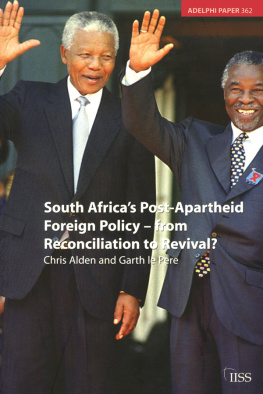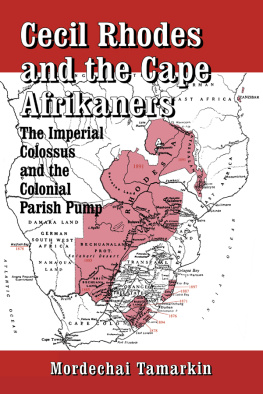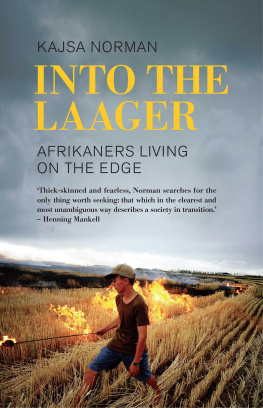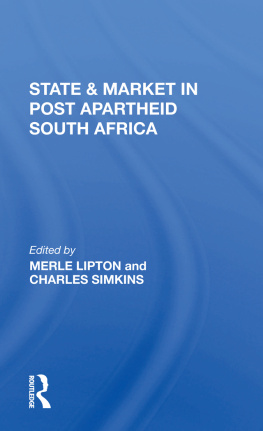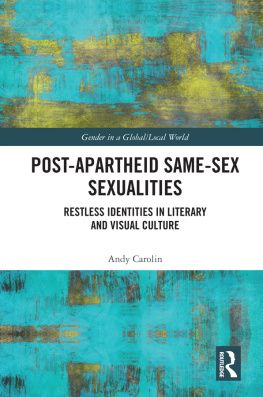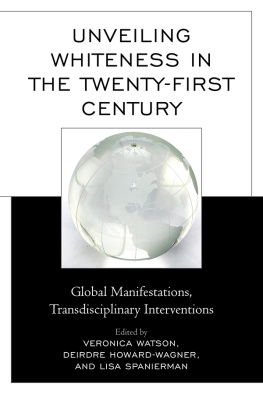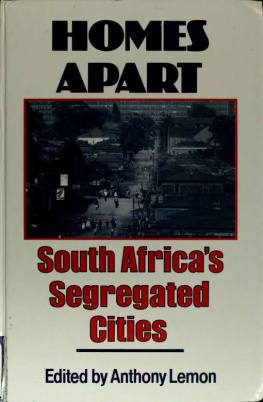First published by the Mapungubwe Institute for Strategic Reflection (MISTRA) in 2018
142 Western Service Rd
Woodmead
Johannesburg, 2191
ISBN 978-0-6399238-1-9
MISTRA, 2018
Production and design by Jacana Media, 2018
Editor in chief: Joel Netshitenzhe
Text editor: Barry Gilder
Copy editor: Christopher Merrett
Proofreader: Isabelle Delvare
Designer: Shawn Paikin
Set in Sabon 10.5/15pt
Printed and bound by Creda Communications
Job no. 003299
When citing this publication, please list the publisher as MISTRA.
All rights reserved. Without limiting the rights under copyright reserved above, no part of this publication may be reproduced, stored in or introduced into a retrieval system, or transmitted, in any form or by any means (electronic, mechanical, photocopying, recording or otherwise), without prior written permission of both the copyright holder and the publisher of the book.
This book is sold subject to the condition that it shall not, by way of trade or otherwise, be lent, re-sold, hired out or otherwise circulated without the publishers prior consent in any form of binding or cover other than that in which it is published and without a similar condition being imposed on the subsequent purchaser.
Kgalema Motlanthe
Kgalema Petrus Motlanthe was born to a working-class family on 19 July 1949 in Alexandra Township, Johannesburg. He was elected President of the Republic of South Africa on 25 September 2008 and served until 9 May 2009.
After his retirement as President, Motlanthe was appointed by President Jacob Zuma to serve as the Deputy President and occupied that position from 11 May 2009 until 24 May 2014. As Deputy President, Motlanthe performed various functions, including the following:
leader of government business in the National Assembly
leader of the Anti-Poverty Programme
chairperson of the Energy Advisory Council
chairperson of the Human Resource Development Council
chairperson of the South African National Aids Council
chairperson of the Inter-Ministerial Committee for the 2010 FIFA World Cup.
In the 1970s, while working for the Johannesburg City Council, he was recruited into Umkhonto we Sizwe (MK), the then armed wing of the African National Congress (ANC). He was part of a unit tasked with recruiting members for military training outside the country.
On 14 April 1976 Motlanthe was arrested with others for furthering the aims of the ANC and kept in detention for eleven months at John Vorster Square in central Johannesburg. In 1977 he was found guilty on three charges under the Terrorism Act and sentenced to an effective ten years imprisonment on Robben Island.
After his release in 1987, Motlanthe was tasked with strengthening the trade union movement in the country. To this end, he worked for the National Union of Mineworkers (NUM) as a national office bearer responsible for education. Among other things, he was involved in training workers to form shop steward committees.
In 1990, when the banning of the ANC and other political organisations was lifted, Motlanthe was tasked with re-establishing ANC structures in Gauteng Province. In 1992 he was elected General Secretary of the NUM, succeeding Cyril Ramaphosa who had been elected Secretary-General of the ANC.
Motlanthe also served two five-year terms as Secretary-General of the ANC, from December 1997 to December 2007. Motlanthe was Deputy President of the ANC from December 2007 to December 2012.
Melissa Steyn
Melissa Steyn holds the DST-NRF South African National Chair in Critical Diversity Studies and is the founding director of the Wits Centre for Diversity Studies. Her work engages with intersecting hegemonic social formations, but she is best known for her publications on whiteness and white identity in post-apartheid South Africa. Her book Whiteness Just Isnt What It Used To Be: White Identity in a Changing South Africa (2001) won the 2002 Outstanding Scholarship Award in International and Intercultural Communication from the National Communication Association in the United States. Her co-edited books include The Prize and the Price: Shaping Sexualities in South Africa Volume 2 (2009), Performing Queer: Shaping Sexualities in South Africa Volume 1 (2005), Under Construction: Race andIdentity in South Africa Today (2004) and Cultural Synergy in South Africa: Weaving Strands of Africa and Europe (1996).
Steyn was featured as one of Routledges Sociology Super Authors for 2013.
Andries Nel
Andries Nel is South Africas Deputy Minister for Co-operative Governance and Traditional Affairs. Elected to Parliament in 1994, he has been Deputy Minister for Justice and Constitutional Development, Deputy Chief Whip and has served on a wide range of portfolio and ad hoc committees. His constituency work has been in Pretoria Central, Centurion, Atteridgeville, Waterberg and Midvaal.
His activism began at high school in So Paulo, Brazil, where his parents were part of the diplomatic corps. As a student he participated in the National Union of South African Students and several other organisations. He co-ordinated the Lawyers for Human Rights Capital Punishment and Penal Reform Project between 1990 and 1994 and was a member of the national executive committee of the ANC Youth League from 1996 to 2001. He is currently the co-ordinator of legal monitoring on the ANCs National Elections Team. He holds a Bachelor of Civil Law from the University of Pretoria and is married to Kim Robinson, CEO of Renaissance Strategic Solutions.
Mary Burton
Mary Burton (full name: Maria Macdiarmid Ingouville Burton) was born in Buenos Aires, Argentina, and attended schools there and in So Paulo, Brazil. In 1961 she married Cape Town businessman Geoff Burton, and they have lived in South Africa since then. They have four sons and ten grandchildren.
In 1965 Burton joined the Black Sash, a womens organisation opposed to apartheid, and later various other civil and human rights organisations. She served as national president of the Black Sash from 1986 to 1990 and is currently a member of its Board of Trustees. In 1994 she served as Provincial Electoral Officer for the Western Cape in the countrys first national democratic elections. In 1995 she was appointed by President Nelson Mandela as a commissioner with the Truth and Reconciliation Commission. She is a previous member of the Council of the University of Cape Town (UCT), and a past president of UCTs Convocation. She has a BA degree from UCT (1982), and in 2011 the university awarded her the degree of Doctor of Social Science, honoris causa. She is a member of the Board of Trustees of the Imam Abdullah Haron Education Trust. Awards: Order of Luthuli (Silver), 2003; Member of the Order of the Disa, 2004.
Christi van der Westhuizen
Christi van der Westhuizen (PhD) is associate professor in Sociology at the University of Pretoria. She is the author of Sitting Pretty White Afrikaans Women in Postapartheid South Africa




